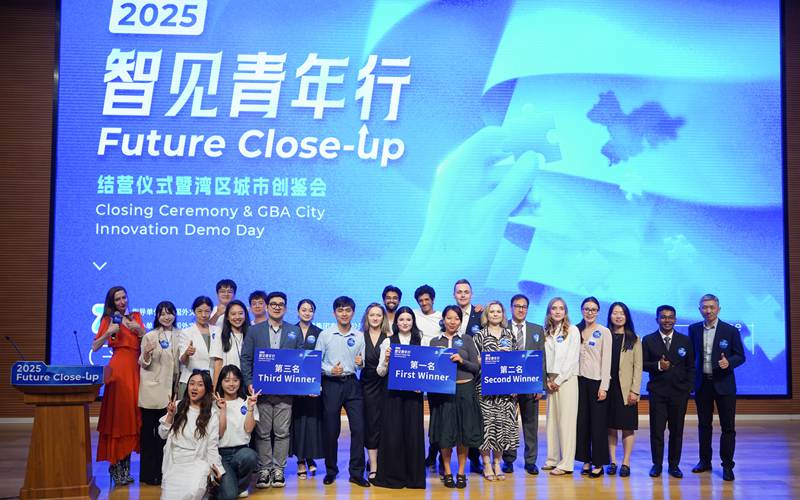
Participants, guests and organizers of the 2025 Future Close-Up program pose for a photo during the closing ceremony, in Shenzhen, Guangdong Province, on June 29 (ZHANG WEI)
On June 29, the 2025 Future Close-Up Closing Ceremony and Greater Bay Area (GBA) City Innovation Demo Day took place in Shenzhen, Guangdong Province in south China.
Guided by China International Communications Group (CICG) and Chinese tech giant Tencent, the Future Close-Up returned for its third edition since its launch in 2023. The global youth exchange program is co-organized by the CICG Center for Americas and Tencent’s Marketing and Public Relations Department. This year, it was themed Guangdong, Hong Kong and Macao: Driving High-Quality Development in the GBA and brought together 16 young delegates from 14 countries and regions, including China, Russia, Saudi Arabia, Germany, Australia and Brazil.
From June 23 to 30, the participants traveled across Shenzhen, Dongguan, Hengqin and Guangzhou in Guangdong Province, as well as Hong Kong Special Administrative Region.
Through site visits and in-depth interactions, the 2025 Future Close-Up built a platform for international youth to gain firsthand insights into Chinese modernization. It also showcased the country’s achievements in scientific and technological innovation and regional coordination, offering a vivid window into the dynamics of China’s high-quality development.
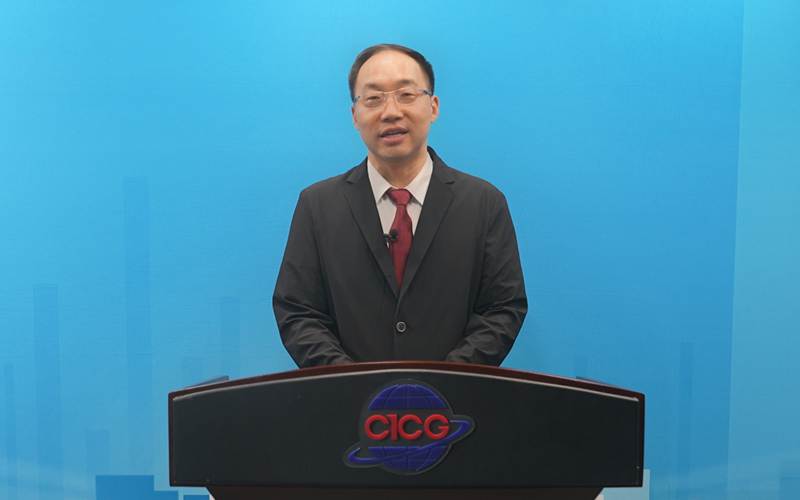
A video address by Yu Yunquan, Vice President of China International Communications Group (CICG), is screened during the closing ceremony of 2025 Future Close-Up program (CICG)
“I hope you can bring the friendships and trust you have built here back to your own countries and communities and carry them forward. You contribute your strength to the ever-growing current of peace and development for humanity,” Yu Yunquan, CICG Vice President, said in a previously recorded speech at the closing ceremony.
As a dedicated and comprehensive international communication organization, CICG has long been committed to promoting Chinese culture abroad and fostering mutual learning among civilizations. “We will continue to leverage our strengths and actively build more high-quality cultural exchange platforms like the Future Close-Up to contribute to enhancing mutual understanding and trust within the international community,” he said.
Yu highlighted the role of global youth in today’s world, as “it falls to your generation to rise above prejudice, dispel misunderstanding, build trust and forge bridges of mutual understanding while paving the way for deeper people-to-people connections.”
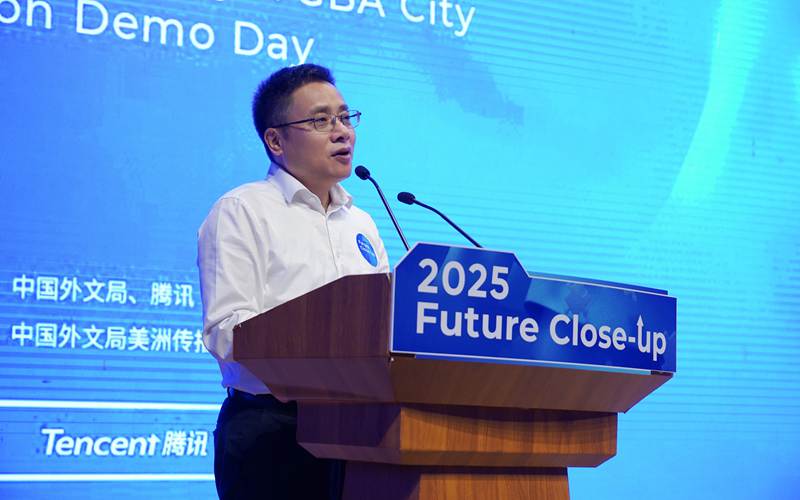
Su Rongcai, Director of the Information Office of the Shenzhen Municipal Government, at the 2025 Future Close-Up Closing Ceremony and Greater Bay Area City Innovation Demo Day (ZHANG WEI)
At the ceremony, Su Rongcai, Director of the Information Office of the Shenzhen Municipal Government, described Shenzhen as a city born out of China’s reform and opening up -- which began in 1978. “It has flourished because of reform and opening up and now stands as a vital window for the world to witness the remarkable achievements of China’s reform and opening up,” he said.
Highlighting the 2025 Future Close-Up as a demonstration of the boundless potential for collaboration among young people from different countries and regions, Su expressed his hope that the international delegates would share their experiences and insights from Shenzhen and the Guangdong-Hong Kong-Macao GBA with wider audiences, helping more people understand the city and the opportunities China offers.
“As a city of openness, innovation and vitality, Shenzhen warmly welcomes you to come here for study, work and entrepreneurship, to grow with the city and create new possibilities together,” he added.
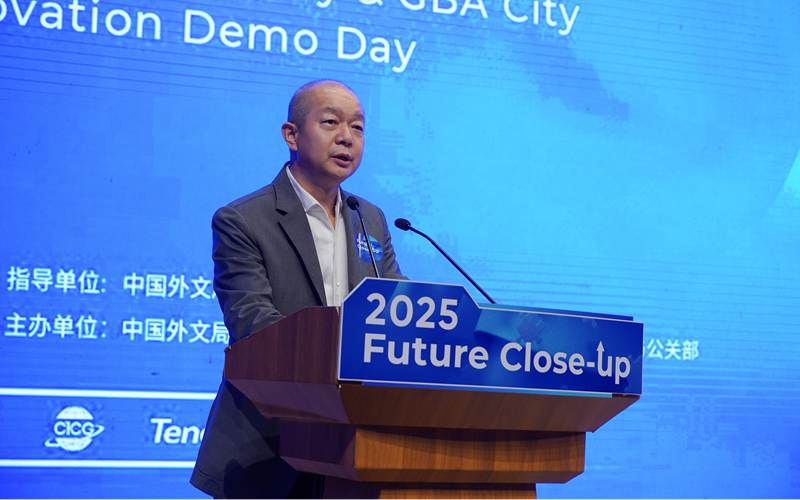
Guo Kaitian, Senior Vice President of Tencent Group (ZHANG WEI)
“Each city in the GBA has its own unique charm, and as one of China’s most developed regions, the GBA also hopes to be better understood by the world,” Guo Kaitian, Senior Vice President of Tencent Group, said.
He said since the program’s inception, Tencent has been dedicated to building connections between people, between people and things, and among things themselves. The Future Close-Up, he said, is an extension of this philosophy of connection.
Whether from a social or technological perspective, young people need to cultivate broader horizons and multidimensional thinking, Guo said. “The best way to learn is to go out into the world with curiosity and discernment to experience and challenge yourself,” he continued, adding the Future Close-Up offers an excellent platform to foster such understanding and exchange.
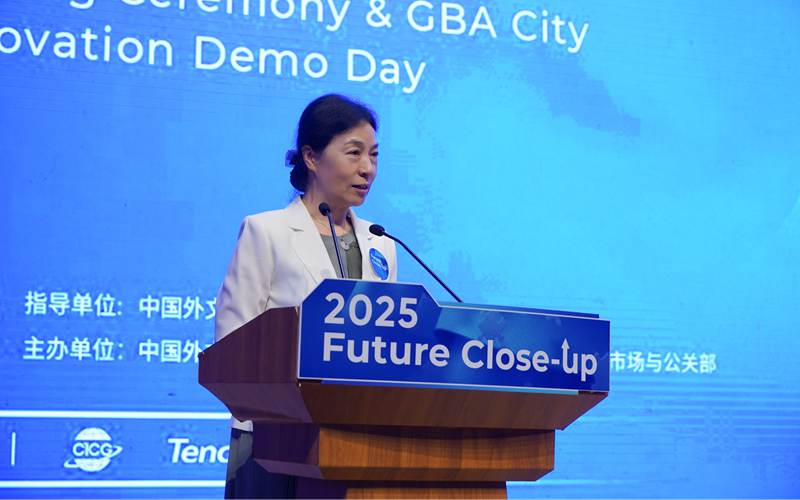
Li Yafang, President of the CICG Center for Americas, addresses the closing ceremony (ZHANG WEI)
“The most beautiful melody of cultural exchange and mutual learning among civilizations is not something distant -- it beats in the hearts of young people,” Li Yafang, President of the CICG Center for Americas, said.
She expressed hope that international youth will turn the insights and spirit gained from this journey into action, drawing on their professional expertise to confront global challenges, fostering cross-cultural connections with goodwill and passing on the torch of civilization through youthful engagement.
“I look forward to the inspiring force of the Future Close-Up spreading to more places around the world, gathering strength like grains of sand building a tower. Looking ahead, we will build more multidimensional platforms for dialogue with the world so that China and other countries can advance hand in hand and develop together,” Li said.
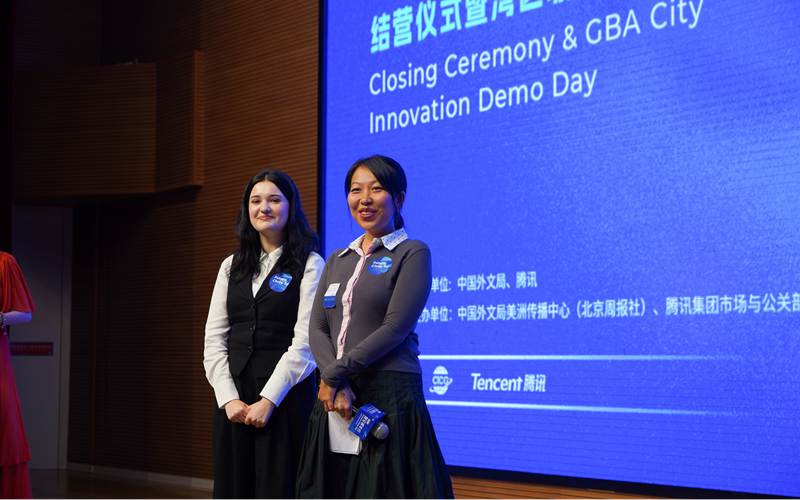
Participants present their group proposal on urban cultural exchange during the GBA City Innovation Demo Day at the closing ceremony of the 2025 Future Close-Up program (ZHANG WEI)
An important part of the closing ceremony was the GBA City Innovation Demo Day, where the 2025 Future Close-Up participants presented their group proposals on urban cultural exchange.
The proposals were the result of a weeklong, in-depth field study and focused on identifying replicable and scalable models from the region’s high-quality development, while also offering innovative suggestions for its future growth. After being reviewed by a panel of judges, these proposals were then submitted to the Shenzhen Museum of Contemporary Art and Urban Planning for filing for future reference.
Through this process, the young participants gained a deeper understanding of how China’s development experience, while rooted in local context, also carries universal insights into shared global challenges.
Following the presentations, Winnie Tam, a senior counsel of the Hong Kong Bar, an independent arbitrator, and a member of the 14th National Committee of the Chinese People’s Political Consultative Conference, the country’s top political advisory body, addressed the young delegates.
“After the return of Hong Kong to the motherland, we can see there are changes in the GBA that none of us were ever able to foresee. We are happy to see a continued integration of the region,” said the Hong Kong native.
She praised the proposals presented by the international delegates, saying, “I can see that all of you are trying to build bridges in your wonderful projects, and you have innovation at your heart.”
She said she believes the 2025 Future Close-Up would leave a lasting impact on how the participants think and view the world, which can help nurture a more open and inclusive mindset, enabling them to embrace the diversity of human civilizations.
To help the international delegates better understand the GBA, Tao Ran, head of the Division of Development and Governance at the School of Humanities and Social Science under The Chinese University of Hong Kong (Shenzhen), introduced the development of Shenzhen as a special economic zone and how the city has grown alongside China’s reform and opening up.
Benefiting from a favorable policy environment, Shenzhen has become home to globally influential tech giants such as Tencent, Huawei and DJI, establishing itself as one of China’s most dynamic hubs of innovation, Tao said. He also offered suggestions for the GBA’s future development.
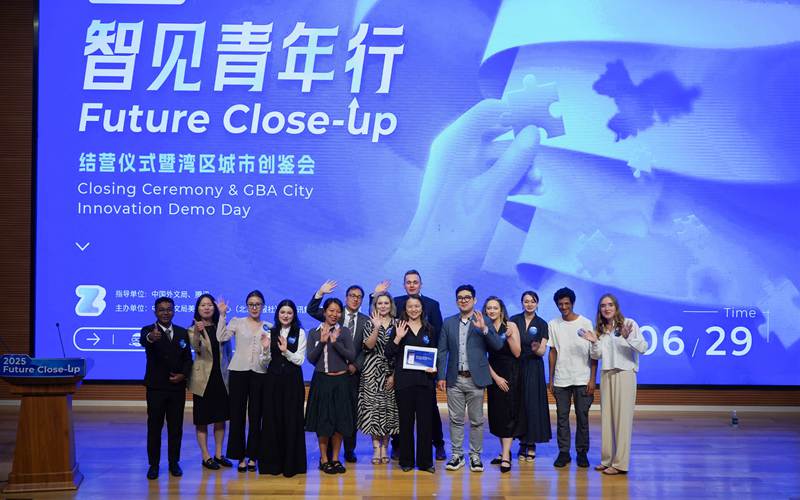
The 2025 Future Close-Up program brings together young delegates from 14 countries and regions including China, Russia, Saudi Arabia, Germany, Australia and Brazil (ZHANG WEI)
The participants all expressed that the 2025 Future Close-Up was a meaningful and unforgettable experience.
Tanvir Parvez Matobbar from Bangladesh, President of the Tsinghua University Student Association of the Belt and Road Initiative, a China-proposed initiative to boost connectivity along and beyond the ancient Silk Road routes, described the Future Close-Up visit as a wonderful and eye-opening experience, saying he “has been learning something new every day.”
“I saw that each place has its own unique structure. This is really important because otherwise, if one city has everything and others have nothing, people would be drawn to the developed one. But with this initiative, every place is gaining opportunities to offer a good life to its residents,” he said.
Portugal-native Vanessa Herdade, a digital solutions manager at a French retail group, said the trip was an interesting journey that showcased China’s leading edge in technology. She cited the rapid development across various sectors, from healthcare to software.
“It’s really about discovering the potential that China has as a technology market,” she said.
She was impressed not only by tech giants like Tencent, but also by how smaller Chinese companies are actively innovating and investing in new technologies and products that have the potential to greatly improve everyday life.
Pedro Steenhagen from Brazil appreciated the trip as “a nearly perfect experience.”
“I think they hit the spot with the choice of this trip and the places we’re going. I think we are learning quite a lot, not only inside the companies but also with the group and all the interactions that we are having among ourselves,” said the Ph.D. candidate in international politics at Fudan University in Shanghai.
He spoke highly of the GBA’s role in boosting cooperation between Portuguese speaking countries and China. “I think it’s becoming a relevant hub for Portuguese speaking countries, with many interesting initiatives arising here. I think it has a lot of potential. I can see that Brazil, Portugal and many other Portuguese speaking countries are increasingly interested in hunting opportunities here,” he said.